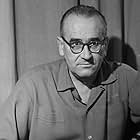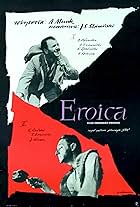I realize that some of the acting in "Bad Luck" may seem to be dated, but still, this movie is one of my all time favorites. Outwardly, it shows three pictures from Polish history in a caricatural and grotesque way: 1930s, the German occupation, and 1950s. It ridicules the "god and country" spirit of the 1930s, some heroic myths from the times of Nazi occupation, and the grotesque, Kafka-like reality of the society living behind the iron-curtain. So for casual viewing the film deals only with Polish problems and does not have universal appeal, but if you look at it more closely it asks much deeper questions. First of all, what the film says on the surface is to a large extent true-the same way as Monty Python's films are still valid. Secondly, "Bad Luck" is also an illustration of some universal truths. Specifically, we are always following some patterns of behavior that don't necessarily agree with our personality. So we sell our own personality to win a woman, achieve popularity with other people, gain money and position, or simply follow the current fashions even in case we regard them as silly or wrong. This is somewhat similar to the themes touched by the Polish writer Witold Gomrowicz in his novel "Ferdydurke", but in the form of a funny comedy. Thirdly, I think that "Bad Luck" also touches on the problem of indoctrination, and its overall conclusions are timeless. I watched this movie for the first time in the late 1970s, when I was 17 or 18 years old. Being made in 1960, it looked very authentic to me, offering some glimpse into an unknown past. I have to mention Bogumil Kobiela too, who was already dead in the 1970s. But I remembered him from outragously funny adaptations of Moliere plays from the 1960s, which I watched when still a child. So it was Bogumil Kobiela, together with Louis de Funes, Jean Paul Belmondo and Alain Delon that sparkled my lifelong sympathy for French culture. But the main reason that "Bad Luck" made such an indelible impression upon me was that at that time I was having similar thoughts about some of Polish traditions. Being raised in a Catholic family in communist Poland, I was exposed to three kinds of mild indoctrinations: religious, communist, and nationalistic. By the age of 17, I had already shaken off religious and communist indoctrinations, but I was still confused with not everything I was told at school about Polish past being true. By that time I was reading Thomas Mann, Franz Kafka, Jean Paul Sartre, Kurt Vonnegut, Arthur Miller and Saul Bellow. In comparison to those names, some Polish writers that we (together with my colleagues) had to study at school looked to us boring, shallow-minded, and their characters one-dimensional and flat. I mean mostly writers like Mickiewicz, Sienkiewicz and Zeromski. Without contesting the literary talents of those people, we had completely different interests and didn't want to waste our time on studying them. I was also beginning to understand that my ancestors in Poland were farmers or craftsmen, and in "independent Poland" were treated much like blacks in America before Martin Luther King. I knew that, for example, Voltaire was happy with the collapse of an independent Polish state in the 18th century not because he was an enemy of Polish people, but because he regarded Poland as an outdated state where common people were treated like slaves. So a lot of my colleagues were rebelling against upbringing where too much stress was put on patriotism and nationalism. Thanks to movies like "Bad Luck", Monty Python or films with young Malcolm McDowell we knew that we were not just a bunch of unruly teenagers. But skepticism and negation are just first steps. In my case, I became an engineer, moved to the West for some years, and was privileged enough to work for more than 30 years in international teams with people from various nationalities and races. We were not only working together in a constructive way but also discussing books, movies, or politics. So I had a chance to replace things that were missing or wrong in my education with those of better informed or wiser colleagues from other countries. But I have always remembered "Bad Luck" as one of the most valuable movies I have ever seen. I will also mention that by birth I belong to the group of people that question things. But there is also a large group of people that just follow the traditions of their fathers, never changing the religion or convictions of their ancestors. They are mostly proud of that and call it "tradition". The world today is still full of religious fundamentalists and nationalists. So it is even more crucial to avoid any indoctrination for the sake of those conservative people, who may be crippled for life with wrong convictions or simplifications. Also, the term "national independence" is a tricky one and is often used by autocrats to excuse their evil intentions and doing. So it is better to try to explain to the young people the world in all its complexity than come up with simplifications, half-truths, or lies. That is why films like "Bad Luck" or Monty Python will always be important, because they give people subjects to think about.







































